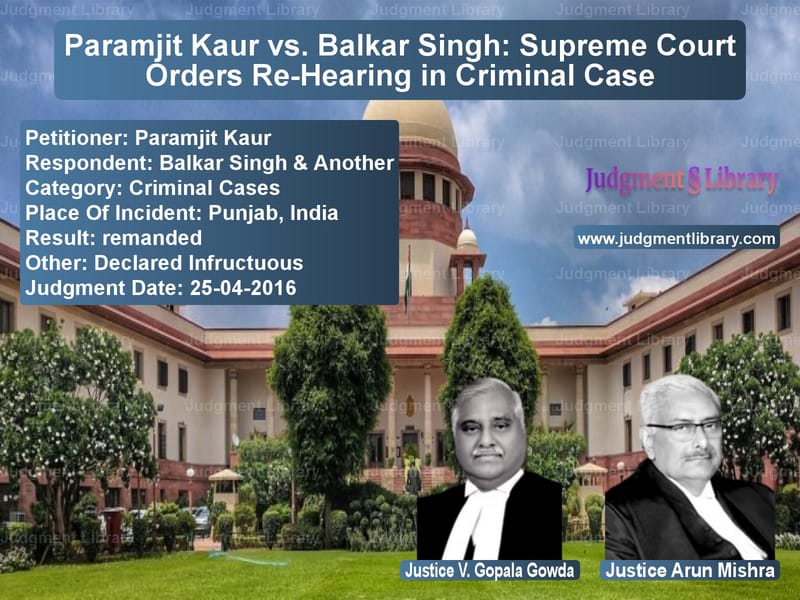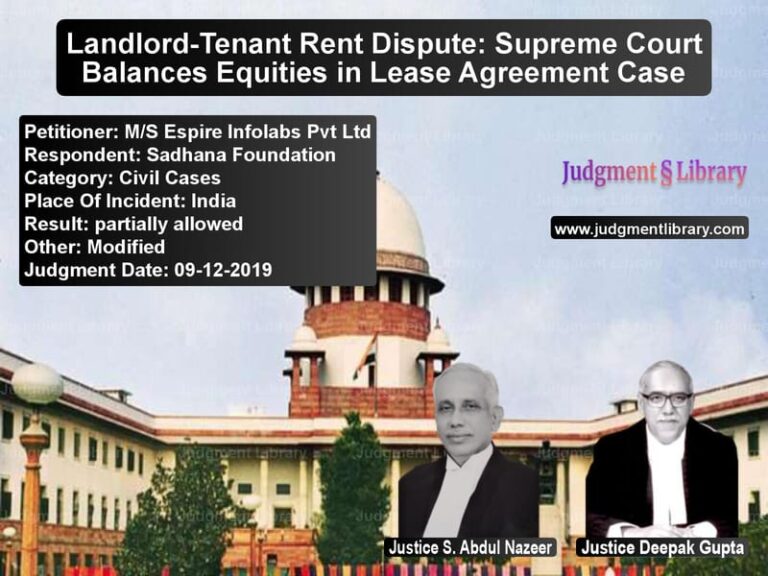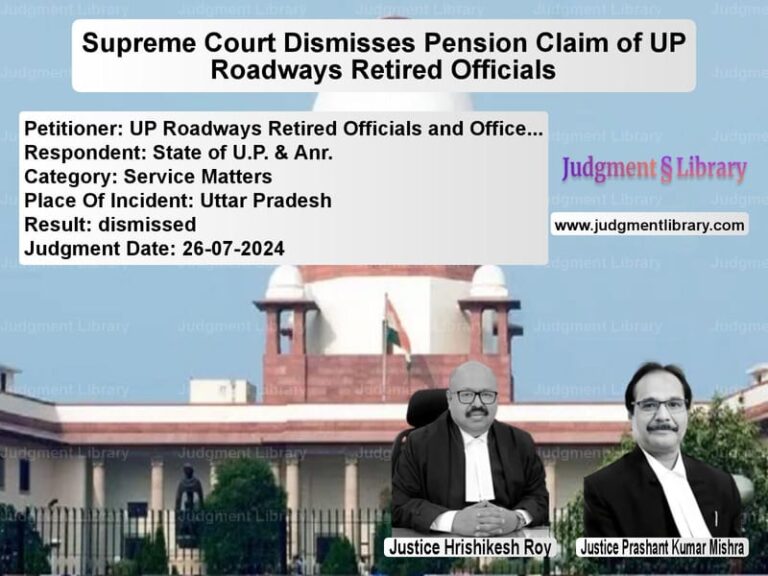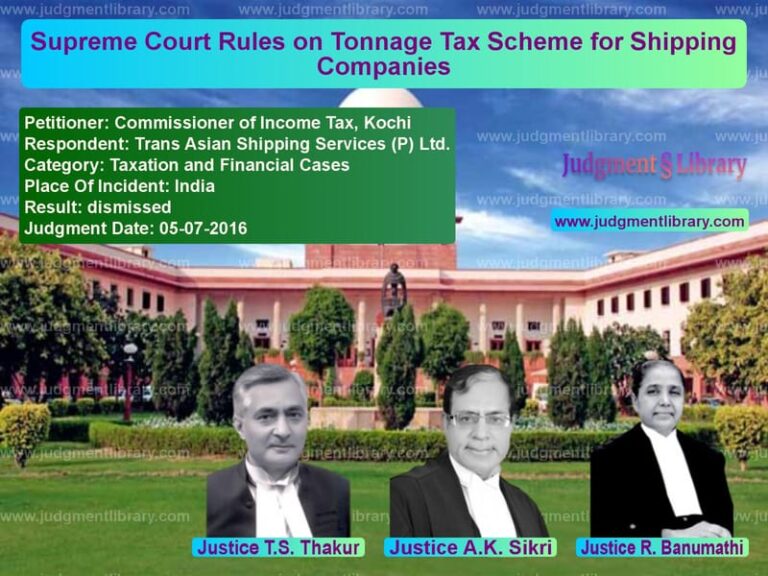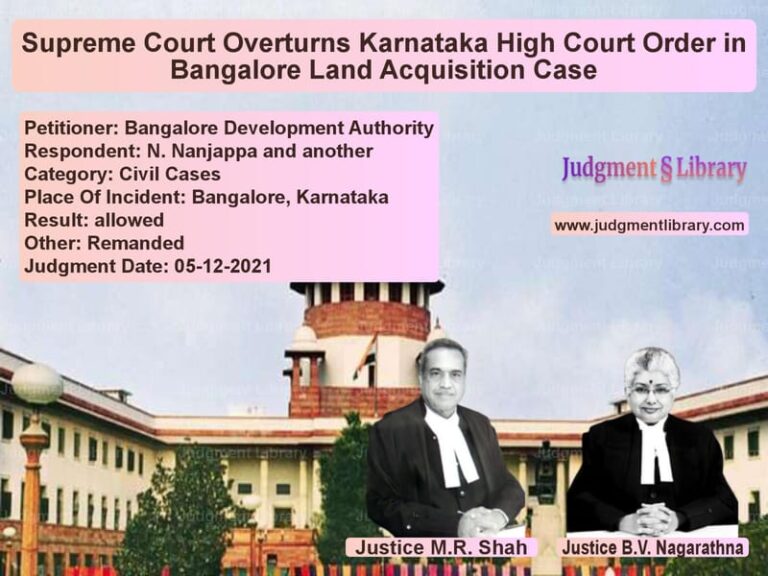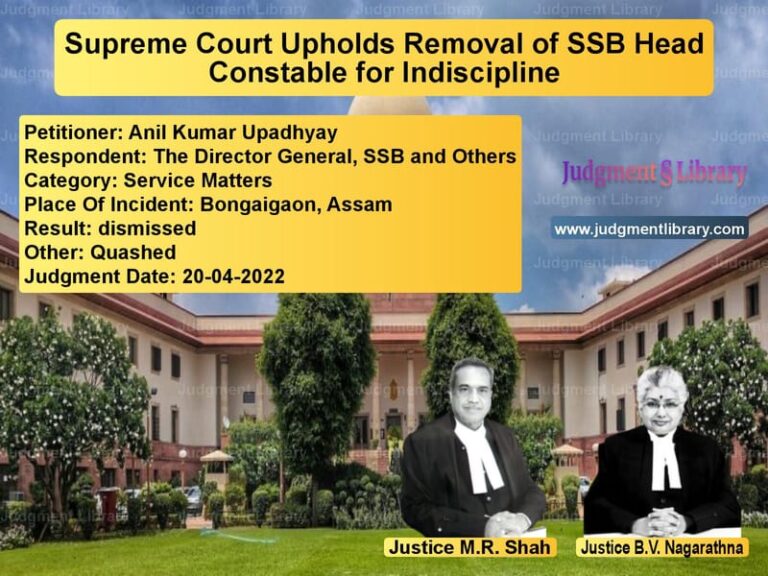Paramjit Kaur vs. Balkar Singh: Supreme Court Orders Re-Hearing in Criminal Case
The Supreme Court of India, in its judgment dated April 25, 2016, ruled in favor of re-hearing in the case of Paramjit Kaur vs. Balkar Singh & Another. This case revolved around the issue of whether charges should be framed against the accused and whether the dismissal of their discharge application by the High Court was justified. The apex court, after analyzing the arguments, found that the case required further deliberation, leading to an order for re-hearing and de-tagging it from other connected matters.
Background of the Case
The case arose from criminal proceedings initiated against the accused persons, where they challenged the framing of charges and the High Court’s decision dismissing their discharge application. The High Court had not only examined the sanction issue but also ruled on the merits, finding no evidence against the accused sufficient to frame charges.
The petitioner, Paramjit Kaur, approached the Supreme Court seeking intervention, arguing that the High Court’s order was flawed and required reconsideration. The Supreme Court found that the case had been tagged along with other similar cases, but upon closer examination, it determined that this case had distinct facts requiring a separate hearing.
Legal Issues Involved
- Whether the High Court correctly dismissed the discharge application.
- Whether the issue of sanction required separate deliberation.
- Whether the accused could be tried in the absence of sufficient evidence.
- Whether the case should be considered independently from other related matters.
Arguments by the Petitioner
- The petitioner argued that the case involved serious charges that required judicial scrutiny.
- It was contended that the accused should not be discharged without a full trial.
- The petitioner sought reconsideration of the sanction aspect separately from the merits of the case.
- It was argued that de-tagging the case was necessary to ensure fair proceedings.
Arguments by the Respondents
- The respondents argued that the High Court had rightly ruled in their favor, as there was no evidence supporting the charges.
- They emphasized that the dismissal of the discharge application was unjustified given the lack of substantive evidence.
- The respondents contended that continuing the trial would amount to an abuse of the legal process.
- They claimed that the prosecution was attempting to prolong the litigation without just cause.
Supreme Court’s Observations
The Supreme Court made several key observations:
- The case was distinct from other connected matters as it involved not only the issue of sanction but also an analysis of the merits.
- No detailed arguments had been made regarding the High Court’s findings on the lack of evidence.
- The court determined that re-hearing was necessary to ensure a fair and just outcome.
- The Supreme Court also emphasized that all matters of law must be scrutinized independently to prevent any miscarriage of justice.
Supreme Court’s Ruling
The Supreme Court issued the following orders:
- The case was de-tagged from other connected matters.
- It was directed to be listed for hearing afresh.
- Further arguments on the merits of the case would be heard separately.
- The High Court was asked to re-examine the discharge application independently.
Analysis of the Judgment
The ruling has significant implications for criminal jurisprudence:
- Re-Hearing Ordered: The Supreme Court found that a fresh hearing was required, distinguishing this case from others.
- Sanction vs. Merits: The judgment clarifies that sanction and merits should be considered separately in such cases.
- Fair Trial Principles: The ruling reinforces the necessity of ensuring that accused persons are not tried without sufficient evidence.
- Judicial Scrutiny: The decision highlights the importance of proper legal scrutiny in cases involving criminal allegations.
Implications of the Judgment
The Supreme Court’s ruling has several important implications:
- Legal Precedent: The case sets a precedent for similar criminal cases requiring thorough examination before proceeding to trial.
- Role of High Courts: High Courts must ensure that both procedural and substantive aspects are considered while dismissing discharge applications.
- Judicial Accountability: The ruling underscores the necessity of a fair hearing for all parties involved.
Conclusion
The Supreme Court’s ruling in Paramjit Kaur vs. Balkar Singh underscores the importance of judicial fairness in criminal proceedings. By ordering a re-hearing, the court ensured that all aspects of the case, including sanction and evidentiary issues, are properly addressed. This judgment sets a precedent for similar cases requiring meticulous examination before proceeding to trial.
Don’t miss out on the full details! Download the complete judgment in PDF format below and gain valuable insights instantly!
Download Judgment: Paramjit Kaur vs Balkar Singh & Anoth Supreme Court of India Judgment Dated 25-04-2016-1741854697093.pdf
Direct Downlaod Judgment: Direct downlaod this Judgment
See all petitions in Bail and Anticipatory Bail
See all petitions in Custodial Deaths and Police Misconduct
See all petitions in Attempt to Murder Cases
See all petitions in Judgment by V. Gopala Gowda
See all petitions in Judgment by Arun Mishra
See all petitions in Remanded
See all petitions in Declared Infructuous
See all petitions in supreme court of India judgments April 2016
See all petitions in 2016 judgments
See all posts in Criminal Cases Category
See all allowed petitions in Criminal Cases Category
See all Dismissed petitions in Criminal Cases Category
See all partially allowed petitions in Criminal Cases Category

